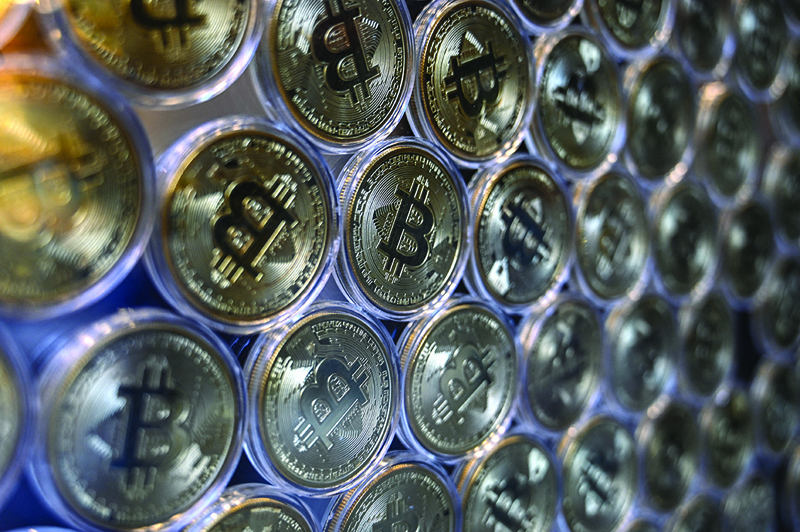 ISTANBUL: A physical imitation of a Bitcoin at a crypto currency "Bitcoin Change" shop, near the Grand Bazaar, in Istanbul. Bitcoin soared above $50,000 for the first time yesterday after surging by almost 75 percent this year.-AFP
ISTANBUL: A physical imitation of a Bitcoin at a crypto currency "Bitcoin Change" shop, near the Grand Bazaar, in Istanbul. Bitcoin soared above $50,000 for the first time yesterday after surging by almost 75 percent this year.-AFPLONDON: Bitcoin soared above $50,000 for the first time yesterday as an increasing number of corporate heavyweights back the world's most popular virtual currency. At around 1235 GMT, Bitcoin hit an all-time high of $50,547.70, marking a 4.4-percent gain since Monday. Bitcoin, once the preserve of internet geeks and hobbyists, has since exploded in popularity and has now rocketed by almost 75 percent in value so far this year. "The crypto king has crossed the 50K price level for the first time as institutions are all over it," said AvaTrade analyst Naeem Aslam.
"There is a lot of FOMO (fear of missing out) among traders as the price is going through the roof and we have limited supply." It later pulled back to stand at $49,080.30 at about 1345 GMT. "The rally has still a lot of power left and the move is going to continue towards the actual target of $100,000," Aslam told AFP. "Of course, there will be some bumps but investors should consider them as an opportunity to bag some bargains."
Bitcoin has been on a meteoric rise since March, when it stood at $5,000, spurred by online payments giant PayPal saying it would allow account holders to use cryptocurrency. The unit blasted its way past $45,000 last week after Elon Musk's electric carmaker Tesla invested $1.5 billion in the virtual unit. In a further boost, Tesla also unveiled plans to accept the cryptocurrency from customers buying its vehicles. Wall Street player BNY Mellon then jumped aboard the Bitcoin bandwagon, announcing plans to accept digital currencies.
The moves came after Mastercard also announced it would accept the unit, even as many regulators remain skeptical. Adding further legitimacy, Twitter chief Jack Dorsey revealed last week that he and rap mogul Jay-Z were creating a fund aimed at making bitcoin "the internet's currency".
Bitcoin, which was launched back in 2009, hit the headlines in 2017 after soaring from less than $1,000 in January to almost $20,000 in December of the same year. The virtual bubble then burst in subsequent days, with bitcoin's value then fluctuating wildly before sinking below $5,000 by October 2018. However, strengthening corporate support has transformed the outlook this time around, commentators say.
"Growing corporate support for the crypto makes this a very different market to what it was in 2017," noted Markets.com analyst Neil Wilson. Bitcoins are traded via a decentralized registry system known as a blockchain. The system requires massive computer processing power in order to manage and implement transactions. That power is provided by miners, who do so in the hope they will receive new bitcoins for validating transaction data.
Oil holds steady
European equities eased after soaring the previous day on reduced coronavirus fears and thanks to mounting optimism over US President Joe Biden's vast stimulus plan, traders said. Meanwhile oil held close to 13-month highs on keen demand hopes amid a severe cold snap in Texas. Asia's leading stock markets closed with strong gains and the dollar declined against the euro and yen. Sterling soared to $1.3952, the highest level for nearly three years. The euro sank to 87.06 pence, the lowest point since May.
A strong pound tends to dent London share prices because it weighs on the profits of dollar-earning multinationals. Wall Street reopens from a long holiday weekend to catch up with Monday's rally, which was rooted in COVID-19 vaccine rollouts, slowing infections, easing lockdowns and hopes of reopening economies. "The return of US markets from their long weekend means that the focus for all investors will be on the Biden administration's push for a big stimulus program," said analyst Chris Beauchamp at online trading firm IG.
While Biden's spending package is widely expected to pass through the Democrat-controlled Congress, analysts have warned it might not be as big as the $1.9 trillion he proposed.
Meanwhile with Britain and the United States leading the way in rolling out vaccines at the same time as they see a sharp slowdown in new cases and deaths, there are growing calls for governments to lift strict containment measures and get life back to a semblance of normal.
The United States on Sunday reported its lowest daily infection number since October, as Britain easily hit a key target for immunizing its highest-risk people. The European Union-which is struggling with its vaccine program-has ramped up plans to deliver more jabs. In London, the mining sector was also in sharp focus yesterday. Shares in Glencore jumped 3.5 percent to 292.10 pence after the Swiss giant restored its shareholder dividend despite deepening losses. Anglo-Australian miner BHP jumped 1.7 percent to 2,267 pence on news of soaring profit and a bumper dividend increase by the group. - AFP











